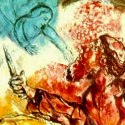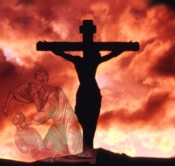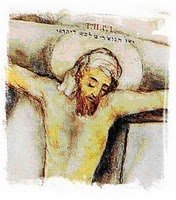|
IN THE TORAH (portion Vayera) we read about how Abraham was asked to sacrifice his son Isaac as a burnt offering on Mount Moriah. In Jewish literature, this supreme test of Abraham's faith is called the Akedah, or the "binding of Isaac."
Now the question may be asked, whose sacrifice was greater, Abraham's or Isaac's? At first we might be quick to say it was Abraham's, since the text plainly says, "God (ūÉū£ūöūÖūØ) tested Abraham by asking him to sacrifice his beloved son (Gen. 22:1-2). Nonetheless, how can we possibly overlook the depth of Isaac's suffering?
According to Rashi (who followed the Seder Olam Rabbah), Isaac was 37 years old when Abraham took him up to Moriah to be sacrificed as a whole burnt offering. But there is no voice of protest, no resisting, no indication that Isaac refused to submit to his father's will. "And they walked, the two of them, together" (Gen. 22:6).
Of course the Akedah reveals Abraham as a great hero of faith. After given the mind-blowing commandment to sacrifice his Divinely promised son, there is no word of protest coming from him, no appeal to God's justice nor intercession for mercy (unlike Abraham's earlier intercession for Sodom and Gomorrah). Perhaps Abraham thought that God was not unlike the tribal deity Molekh who required the sacrifice of children to appease his anger. As Kierkegaard reminds us in his book Fear and Trembling, this is yirat Elohim - the fear of God - taken to the extreme. Indeed, one tradition suggests that the real test of the Akedah was not whether Abraham would obey the command to sacrifice his son, but rather whether he would obey the Angel's Voice of Compassion (ūÖūöūĢūö) to refrain from killing him! Nonetheless, as Maimonides remarked, had Abraham not believed in the absolute truth of God's promise, he never would have lifted his hand to slaughter his beloved son....

However, there is a midrashic tradition that Abraham actually went through with the act of sacrifice on Moriah. After all, the subsequent text shows Abraham returning alone from the mountain. So where was Isaac? According to this tradition he was left "as ash" upon the altar -- though later God miraculously brought him back to life. In other words, Isaac suffered martyrdom. Another midrash says that though Abraham did not actually go through with the sacrifice (his hand was stayed by the Angel), the trauma caused Isaac to flee from his father and seek refuge with Noah's son Shem (who was considered "Malki-Tzedek" and the high priest of Salem). The Midrash Hagadol states, "Although Isaac did not die, Scripture regards him as though he had died. And his ashes lay piled on the altar. That is why the text mentions Abraham and not Isaac." Note that the next time we hear of Isaac he is with his Gentile bride (Gen. 24:64-67).
At any rate, what might have been running through Isaac's mind when Abraham summoned him to go on this fateful three-day journey? The text from the Torah is silent about any conversation the two might have had on the way to Moriah.
According to Nehama Leibowitz, when the Torah records a dialogue and wants to indicate a change in speaker, it does so by means of the word vayomer - "and he said." Shlomo Riskin notes that the only recorded dialog about the purpose of the journey to Moriah occurs at the end, when Isaac notices the fire and the wood for the sacrifice. "Vayomer Yitzchak el-Avraham aviv..." ("And Isaac said to his father..."). But notice that immediately following this statement is another vayomer: "vayomer avi..." ("and he said, my father..."). The idea is that Isaac at first tried speaking, but couldn't find the words to express his dark suspicion.... When he tried again, all he could utter was, "my father...," and Abraham then reassured him: "Hineni v'ni" ("Here I am, my son"). Then came Isaac's third vayomer, "Vayomer hinei ha'esh v'ha'etzim, v'ayeh ha-seh l'olah?" ("And he said, "Behold, the fire and the wood, but where is the lamb for a burnt offering?"). It is hard to imagine Isaac's pathos during this exchange. On the third day of the journey into the unknown, "he said ... [ silence ] ... he said, 'my father....' he said, '...but where is the lamb for a burnt offering?'"
Isaac doubtlessly foreknew the plan but understandably had trouble verbalizing the horror of the situation. Abraham's subsequent "vayomer" in the dialog is telling: "vayomer Avraham, Elohim yireh-lo ha-seh l'olah b'ni," which may be rendered as "God will see for himself a lamb for the offering -- my son." In other words, you, my son, are the lamb for the offering! And at this moment the choice was given to Isaac...
So what did Isaac do when he fully understood the purpose of this mission from his aged father? How did he choose? He did not resist.... he willingly submitted himself in trust and allowed himself to be bound to the altar. Such was his love... and passion.

As Messianic believers, we understand the Akedah as a foreshadowing of the ultimate sacrifice the heavenly Father would give on our behalf. Both Isaac and Yeshua were born miraculously; both were "only begotten sons"; both were sacrificed by their fathers at Mount Moriah in their 30's; both experienced a "passion"; both willingly took up the means of his execution; both were resurrected on the third day (Gen. 22:5, Heb. 11:17-19); and both demonstrate that one life can be sacrificed for another ŌĆō the ram for Isaac, and Yeshua for all of mankind.
The first occurrence of the word love in the Scriptures (ūÉūöūæūö, ahavah) (Gen. 22:2) refers to Abraham's love for his "only" son who was offered as a sacrifice on Moriah (the very place of the crucifixion of Yeshua), a clear reference to the gospel message (John 3:16). Some scholars have noted that the word ahavah comes from a two-letter root (ūöūæ) with Aleph (ūÉ) as a modifier. The root means "to give" and the Aleph indicates agency: "I" give. Love is essentially an act of sacrificial giving... The quintessential passage of Scripture regarding love (╬▒╬│╬▒ŽĆ╬Ę) in the life of a Christian is found 1 Corinthians 13: "Love seeketh not its own..." The antithesis of love is selfishness, the root of pride, fear, etc.
Both Isaac and Yeshua sacrificed their lives in obedience to their fathers' will. Both accepted the promise of God and believed that love was stronger than death. The passion and sacrifice of Isaac was a dramatic foreshadowing of the greater passion and sacrifice of Yeshua, the beloved Son of God Himself. The shared suffering of the Heavenly Father and Yeshua was the means by which "righteousness and peace have kissed" (Psalm 85:10), thereby restoring the children of promise to their original inheritance.
 |
|




